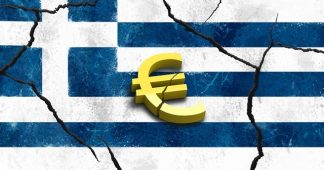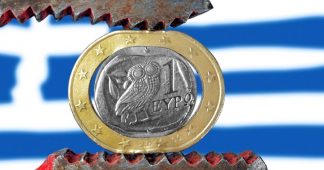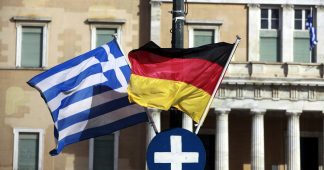Economist Heiner Flassbeck describes how Germany’s “shocking” position on no debt reduction of Greece’s debt, even though its debt is completely unpayable
May 28, 2017
Biography
Dr. Heiner Flassbeck graduated in April 1976 in economics from Saarland University, Germany, concentrating on money and credit, business cycle theory and general philosophy of science; obtained a Ph.D. in Economics from the Free University, Berlin, Germany in July 1987. 2005 he was appointed honorary professor at the University of Hamburg.
Employment started at the German Council of Economic Experts, Wiesbaden between 1976 and 1980, followed by the Federal Ministry of Economics, Bonn until January 1986; chief macroeconomist in the German Institute for Economic Research (DIW) in Berlin between 1988 and 1998, and State Secretary (Vice Minister) from October 1998 to April 1999 at the Federal Ministry of Finance, Bonn, responsible for international affairs, the EU and IMF.
Worked at UNCTAD since 2000; from 2003 to December 2012 he was Director of the Division on Globalisation and Development Strategies. He was the principal author of the team preparing UNCTAD’s Trade and Development Report, with specialization in macroeconomics, exchange rate policies, and international finance. Since January 2013 he is Director of Flassbeck-Economics, a consultancy for global macroeconomic questions (www.flassbeck-economics.com). Co-authored ACT NOW! The Global Manifesto for Economic Policy published in 2013 in Germany.
Transcript
SHARMINI PERIES: It’s the Real News Network. I’m Sharmini Peries coming to you from Baltimore. On Monday in Brussels, a meeting of the Euro zone finance ministers over the Greek debt became so heated it collapsed. In spite of the bailouts, Greece remains in deep debt, and in spite of having implemented massive austerity policies, it is still struggling to meet its payments. In order to ensure that Greece will meet all the payments this summer, it needs a severe, I mean a severe, debt forgiveness. This was the topic of the foreign ministers meeting when the talks collapsed. On to talk about this with me is Dr. Heiner Flassbeck. He was the director of the Division on Globalization and Development Strategies at UNCTAD. He’s now the director of Flassbeck Economics, a consultancy for global macroeconomic questions. Heiner, thank you so much for joining me.
H.FLASSBECK: Thank you for inviting me.
SHARMINI PERIES: Heiner, why did the talks collapse, and what is the role of the German institutions in all of this?
H.FLASSBECK: Meanwhile they have an agreement, so they fell apart first in the first round, but meanwhile they have redesigned the standard on the continuation of the bailout program. The Greek government will receive another tranche of something like 10 billion, and they have decided not to go into debt relief before 2018. This was a German condition. The Germans have pushed through their position in the Euro group and the IMF, which was dissenting in the first round, now has agreed to this agreement, this new contract.
SHARMINI PERIES: Meanwhile, what is happening to the Greek citizens is not even covered in the media anymore. They’re carrying the brunt of this debt crisis. Give us a sense of what’s happening on the ground, Heiner
H. FLASSBECK: First of all, the situation is absolutely disastrous in Greece. Poverty is all around the place. Greece has the deepest depression that any industrialized country has had in the last 100 years, exceeding the sharpness of the depression in the United States in the Great Depression. It’s absolutely unimaginable what is happening there, and nevertheless they go on with the austerity policy. They have decided new measures to cut pensions. The pensions have been cut already by something like 30% now. They decided another cut of 18%. It’s absolutely amazing. It’s absolutely shocking that the Western world is going on with these kind of policies and not seeing that Greece is on the ground already and cannot go deeper. What they talk about is recovering, but now even they have postponed the recovery again. They have postponed it 10 times in the last five years. They talk always about recovering, but there is no recovery.
SHARMINI PERIES: Heiner, when Greece got its bailout dollars or euros in the past, the terms required of it was that it would maintain a 3.5% surplus. Explain this issue of the budget surplus. Is it realistic for Greece to run a 3.5% surplus as Germany is demanding?
H. FLASSBECK: The data are very clear. The only thing they have they are proud of is what they mentioned, the primary surplus. That’s a surplus in the budget, but it doesn’t mean anything. What does it mean if the government has a small surplus in the budget without payment, without interest payments? Primary means without interest payments. What does it mean if the situation is disastrous and the population, in large part, is starving and is really poor? It’s getting falling into poverty, which is a ridiculous success, so to say. Obviously nobody can stop it. Even the Americans did not stop it through the IMF. Obviously they had other discussions with the Germans, and they didn’t insist here that at some debt relief would come immediately.
SHARMINI PERIES: Okay. The agreement that they came to back in Brussels includes the IMF? I know IMF was holding back and asking for more debt cancellation on the part of Greece. Is that in fact what happened? I know that Brussels or Germany in particular was refusing to go forward with any sort of agreement without the involvement of the IMF because they think the IMF will be more stern in terms of making sure that Greece pays back this money.
H. FLASSBECK: Yeah, it’s a strange situation concerning the IMF and the German situation. Initially, and five years ago, the Germans decided in the parliament that there should be no agreement without the IMF because they thought, “The IMF, these are the tough guys. They’re pushing through austerity whereas the people in Brussels and Frankfurt, so the ECB and the European Commission, you cannot really trust.” Meanwhile it has changed, paradoxically. The IMF is insisting that there should be some debt cancellation, some debt relief for Greece, because they say, “Under the conditions, public debt is unbearable.” If it is unbearable, the creditors have to do something to make it bearable otherwise it would not be not in line with the IMF principles to agree. Nonetheless, they agreed in the end. As I understand the news from everywhere, they agreed in the end, which as I said, there was a fight obviously inside the IMF, and Germany prevailed, and Europe prevailed. The U.S. gave in. I think the U.S. was behind it, because what is the IMF? The IMF is always steered by the large stakeholders, which is the U.S. and Europe. Obviously the U.S. administration has given in on this point, as I said maybe because they have other topics where they want to challenge the Germans. You heard your president saying that the Germans are really bad on trade. He’s right. We mentioned it in a former interview. He has a good point, and I hope he will come through with it.
SHARMINI PERIES: Heiner, there are NATO meetings going on. Greece is a part of NATO, and I understand in spite of the debt crisis in Greece, they were buying weapons instead of feeding the people, weapons they actually don’t even need. There was a scandal about this a little while ago where German arms manufacturing companies bribed Greek officials to buy arms. Tell us more about that.
H. FLASSBECK: Yeah, it was obviously so. It was about submarines from Germany. It was obviously so. I do not know the details of the story, but that part of the money was thought, the [inaudible 00:07:59] money, was thought to go into the military project. The cuts that they asked the Greek government to perform is mainly in the social area, and the ideological reason for that is the simple reasoning behind that is Greece’s labor market is inflexible, and the pension system is not sustainable for the next 100 years, and things like that. Nobody says, “You need to cut down the military expenditure to survive economically.” That is an absolute taboo. Nobody is going into that, because they’re following the neoliberal ideology. If you cut labor standards, if you cut down pensions, and because you do all these things, this is a virtual thing, and this will bring about growth in the long term, whatever the long term is. We all know it’s nonsense, but this is the ideology that’s ongoing. By the way, your president is now in Italy. They’re discussing G-7 affairs in the south of Italy.SHARMINI PERIES: Are there any thoughts about what’s coming out of the G-7 meeting that we should be worried about?
H.FLASSBECK: As I said, one thing, the only one point where Trump indeed has a point that has to be made is on trade. On trade, Germany is call it bad or call it whatever you want, unfair. He has a very clear point that German surpluses cannot go on. The point is, these German surpluses are the cause of the European crisis, the crisis in the European currency union. This is why Greece is in such a bad shape. It is absolutely [dereguling 00:10:00], and I was hoping all the time for the U.S. administration, even under Obama, to put more pressure on Germany to reduce its trade surpluses. If something like that would come now, that would be even for Europe very helpful.
SHARMINI PERIES: All right, Heiner. I thank you so much for joining us today, and we’ll keep an eye on what’s developing in Greece and of course in Europe, too. I thank you so much for joining us.
H.FLASSBECK: Okay. You’re welcome. Bye-bye.
SHARMINI PERIES: Thank you for joining us here on the Real News Network.











